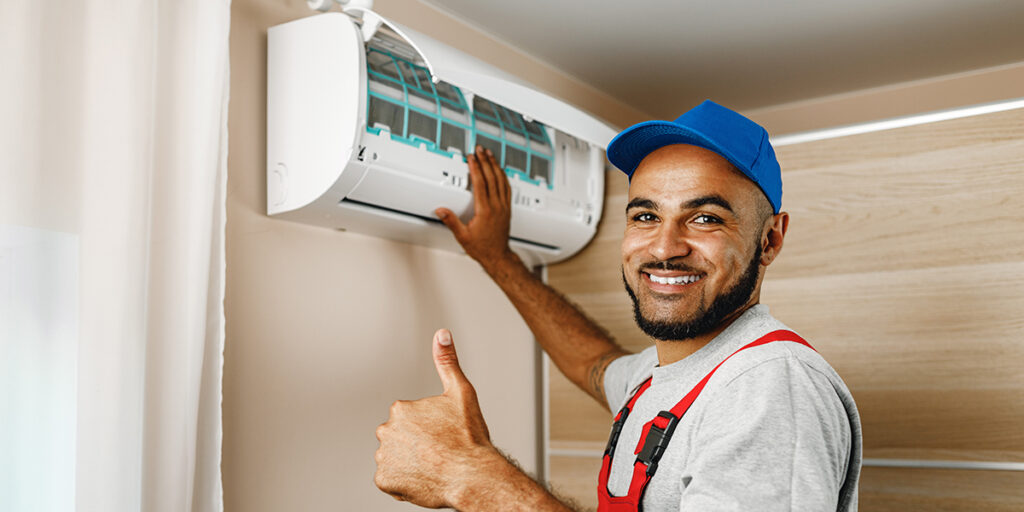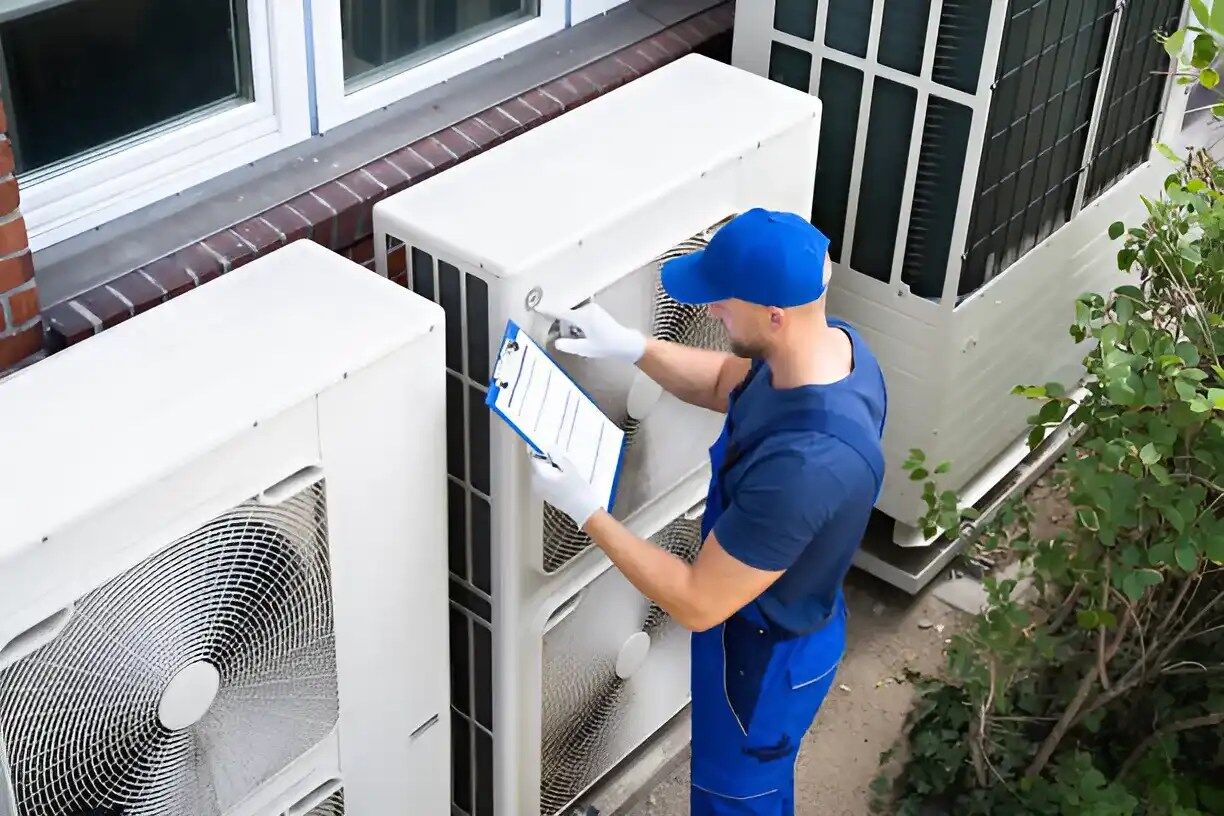Ac Air Conditioner Repair - Questions
Air conditioning Repair Near Me: Specialist Cooling System Remediation Ensures Your Home Stays Comfortable Throughout The Year
Kinds Of AC Systems
When taking on air conditioner repair, comprehending the type of cooling system you're dealing with can conserve time, cash, and stress. Ever questioned why some units cool a space faster than others? Or why particular systems seem to break down more often? Let's peel back the layers.
Central Air
Indicators on Air Conditioning Repair You Should Know
Envision a cool breeze streaming through a whole house, whispering comfort into every corner. Central air systems do precisely that. They use a network of ducts to distribute cooled air, relying on a compressor and condenser outside, here matched with an evaporator coil inside. However when this complex monster falters, determining the issue can be like finding a needle in a haystack.
Split Systems

Split systems are a popular choice for lots of homes-- part indoor unit, part outdoor compressor. They provide flexibility and performance, however their dual nature indicates repair work can include either component. Have you ever heard an unusual sound outside your home only to find the indoor system isn't cooling? That's a timeless indication of a split system problem.
The 30-Second Trick For Ac Repair
Window Units
These compact warriors fight summer heat by fitting comfortably into a window frame. They integrate all components into a single box. Their simpleness often means fewer repair work headaches, but neglecting filters or enabling particles buildup can lead to decreased performance or breakdowns.
Ductless Mini-Splits
Ac Air Conditioner Repair for Beginners
Ductless systems bypass ductwork totally, making them ideal for homes without existing ventilation. They're peaceful, effective, and surprisingly resistant. When repairs are required, service technicians need to be adept at dealing with refrigerant lines and electrical connections-- no little feat.
Quick Referral Table
| Type | Secret Features | Typical Repair Issues |
|---|---|---|
| Central Air | Ductwork, whole-house cooling | Duct leaks, compressor failure |
| Split System | Indoor & & outdoor systems | Refrigerant leaks, fan motor concerns |
| Window Unit | All-in-one, simple installation | Dirty filters, electrical faults |
| Ductless Mini-Split | No ducts, zoned cooling | Line leaks, sensor breakdowns |
Facts About Air Conditioning Repair Revealed
Unwinding one of the most Frequent Air Conditioner Problems
Have you ever questioned why your a/c unit all of a sudden stops cooling during a sweltering afternoon? One typical perpetrator is a dirty or clogged up air filter. This tricky bad guy restricts air flow, forcing your system to work overtime, which not just reduces performance but can likewise lead to premature breakdowns. Envision attempting to breathe through a headscarf taken in dust-- it's tiring!
Another regular hiccup is refrigerant leaks. These unnoticeable leakages don't simply reduce cooling power but can likewise damage the compressor, the heart of your air conditioner unit. How often do you examine for unusual hissing sounds or ice development on the coils? Capturing these indications early can conserve you from costly repair work down the line.
Beyond the Essentials: Lesser-Known Issues
The 9-Second Trick For Repair Air Conditioner Near Me
Often, the thermostat itself is the nuisance. Miscalibrated or faulty thermostats send out mixed signals, causing the a/c to cycle erratically. Ever experienced your AC turning on and off in quick succession? That's called short cycling, a sly efficiency drainer that can break components much faster than you 'd anticipate.
Electrical problems, such as worn circuitry or a malfunctioning capacitor, might prowl underneath the surface. Air Conditioner Repair Near Me. These often manifest as AC systems stopping working to begin or unexpectedly shutting down. An expert eye knows to check these components with precision tools, something a casual look won't expose
Expert Tips for Diagnosing Common Air Conditioning Problems
The 9-Minute Rule for Air Conditioning Repair
- Examine and replace air filters regularly-- every 1 to 3 months depending upon usage and environment.
- Listen for uncommon sounds like rattling or buzzing that might signal loose parts or electrical faults.
- Check the outdoor system for debris or blockages that restrain airflow and cause overheating.
- Search for frost accumulation on evaporator coils, a tip towards refrigerant problems or air flow constraints.
- Check the thermostat settings and recalibrate if the temperature level readings feel off.
Quick Reference Table: Symptoms & & Probable Triggers

| Sign | Probable Cause | Professional Tip |
|---|---|---|
| Warm air blowing | Low refrigerant or dirty coils | Clean coils and look for leakages immediately |
| Short cycling | Thermostat issues or large system | Change thermostat settings and speak with sizing standards |
| System won't start | Electrical faults or capacitor failure | Test electrical wiring and change capacitors as required |
| Water leakage | Clogged drain line or frozen evaporator | Clear drain lines and check for coil icing |
DIY A/c Maintenance Tips
The Main Principles Of Fix Air Conditioner
Ever discovered your a/c sputtering like an old engine on a hot summer day? Neglecting subtle signs often means more than simply a sweaty afternoon-- it's a start to unforeseen air conditioning repair costs. But what if you could catch those whispers before they become wails? Routine do it yourself upkeep can be your first line of defense.
Easy Steps to Keep Your Air Conditioning Running Efficiently
Getting The Ac Air Conditioner Repair To Work
- Clean or Change Filters: A clogged filter is like attempting to breathe through a headscarf. Every 1-3 months, inspect and switch out your filters. It enhances air flow and performance, avoiding compressor strain.
- Check the Condenser Coils: Dust and debris function as invisible blankets smothering your system's cooling power. Carefully brush or vacuum the coils, however prevent harsh chemicals that might deteriorate the metal.
- Inspect the Drain Line: When was the last time you glimpsed at your drain pan? A stopped up drain can trigger water leaks and foster mold growth. Flushing it with a vinegar option monthly keeps the circulation clear.
- Seal and Insulate: Are your ductworks whispering leakages? Sealing gaps with mastic or foil tape improves efficiency and reduce unequal cooling.
Pro Tips Beyond the Basics
- Step your unit's voltage to capture subtle electrical wear before it sparks big problems.
- Listen for uncommon hums or rattles-- these acoustic breadcrumbs typically signify loose parts or stopping working motors.
- Keep outdoor systems shaded however make sure at least 2 feet of clearance around them for optimum airflow.
Ask yourself: Are you hearing your air conditioner's quiet SOS or just waiting on it to shout? Requiring time for DIY air conditioning upkeep transforms reactive repair work into proactive care, conserving sweat, stress, and yes, cash.
The Ultimate Guide To Air Conditioning Repair Near Me
Why Expertise in A/c Repair Matters
Envision this: your air conditioning unit sputters and groans during a scorching afternoon, leaving you sweltering inside. Would you trust an amateur fumbling with fragile elements, or would you look for the reassurance of a professional a/c specialist!.?.!? The complexities of modern cooling systems demand precision and experience. A slight mistake can intensify a small breakdown into a costly disaster.
The 4-Minute Rule for Air Conditioner Repair Near Me
Hidden Complexities Behind the Cool Breeze
Many underestimate the layers hidden beneath the sleek outside of an a/c unit - Air Conditioner Repair Near Me. From refrigerant leakages that calmly drain pipes performance to faulty thermostats that misread temperature levels, these issues need more than a basic toolkit. Professionals have an eager eye for identifying problems that balance house owners overlook
Essential Tips for Selecting the Right Professional
Examine This Report about Ac Fixing
- Accreditation and Training: Verify credentials; a professional trained in the most recent a/c technologies is invaluable.
- Experience with Specific Systems: Not all a/c units are created equivalent; discover somebody acquainted with your design's peculiarities.
- Diagnostic Technique: Experienced technicians utilize advanced tools-- like electronic leakage detectors and thermal imaging-- to determine concealed faults.
What to Get out of a Pro's Diagnostic Process
| Action | Function | Professional Insight |
|---|---|---|
| Visual Evaluation | Recognize obvious wear or damage | Try to find deterioration or uncommon noises-- an indicator typically neglected |
| Pressure Evaluating | Spot refrigerant leaks | Subtle pressure drops can mean micro leakages unnoticeable to the naked eye |
| Electrical Checking | Guarantee circuit integrity | Loose connections can mimic serious mechanical failures |
The Greatest Guide To Air Conditioning Repair
Why DIY Often Falls Short
Appealing as it is to tinker with your a/c system, do it yourself repairs frequently miss the origin. Topping off refrigerant might briefly cool your area but overlooks leaks that intensify over time. Professional specialists do not just patch signs; they hound the underlying mechanical and electrical faults that sap efficiency.
The Main Principles Of Repair Air Conditioner Near Me
Concerns to Ask Before Working with
- What diagnostic tools do you utilize to identify issues?
- Can you explain the repair procedure and expected results?
- Are you acquainted with the refrigerants compatible with my system?
- Do you follow safety protocols for managing electrical elements?